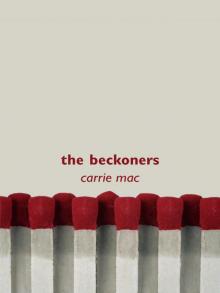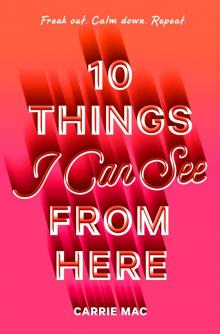- Home
- Carrie Mac
The Opposite Of Tidy Page 2
The Opposite Of Tidy Read online
Page 2
“Next Saturday. Does that work for you?”
“Absolutely.”
Wade signalled and steered off the main road.
“So . . . you think maybe Tabitha could come too?”
And all of a sudden, Junie was confused. He’d picked her up, was chatting her up, making her stomach churn with nerves, and now he wanted to talk about Tabitha?
Maybe he wanted Tabitha, and he was trying the classic Best Friend Bait and Switch move. It would make sense that he’d want the prettier one. The one with long, lovely auburn curls and long, lovely legs to match. The one who actually had tits, and the ass to back them up. Last September, Tabitha had tried to convince Junie that she’d really blossomed over the summer, but Junie knew that Tabitha was just being nice. The fact was that her friend had blossomed even more over the summer, which was why they were at the mall buying Tabitha new bras when she made the empty compliment to Juniper. Yes, Junie had gotten taller, and yes, she’d recently gotten her braces taken off, and yes, she could finally actually justify a AA cup, but the truth remained that she was somewhat of an ugly duckling. She could only hope that someday she’d get to be the swan. For now, she was nothing but a go-between. Figures.
“I don’t know. I’ll check.” She was sure that her tone gave away her disappointment.
“It’s just, the more the merrier with this kind of thing. Ollie and Lulu are in. They’re the ones who said I should ask you. You’re friends with them, right? So they’re in.”
“Turn here,” Junie said. Thank God the ride was almost over, because she was feeling awash with petulance that she was not entitled to. She and Tabitha had a rule. If a guy liked one of them better than the other, that was just the way it was. The less-liked would bow gracefully out of the way, no questions asked. It had been all hypothetical until now, and therefore hypothetically easy until now. But put into practice, Junie wasn’t so sure.
Wade glanced at the street signs. They were at the intersection of Lambert and Fourth.
“Which house is yours?”
A lie could take any shape. Like the one Junie was forming at that moment as she glanced at the house on the corner. The lie she was about to tell was shaped like embarrassment, bloated and pale.
Wade slowed. “Which one is it?”
In the driveway with the minivan and the red sports car, fat Mrs. Rawley was screaming at Mr. Rawley, in broad daylight for all to see. There was Mrs. Rawley in her housecoat, open over her dingy sweat suit, ratty slippers on her feet, and Mr. Rawley—looking sharp as usual in a threepiece suit—red in the face like he was about to explode. He had a suitcase dangling from each arm, and the trunk of the sports car was stuck open, jammed full of boxes. He looked as though he was about to hurl the suitcases at Mrs. Rawley. And who would blame him?
“It’s a ways yet.” Junie brought her hand to her face. She slumped a little in the seat. “Next block.”
“See those two?” Wade pointed at Mr. and Mrs. Rawley. “Putting on quite the show.”
“I see them.” Junie slouched even lower. “Keep driving.”
“But you said Lambert. And Fourth.”
“Near Lambert. Next block. Second house in. Cape Cod, Wedgwood blue, biscuit trim. Cherry trees up and down the block.”
Patsy Cline was singing about being crazy in love, which seemed extra sad, watching Mr. and Mrs. Rawley fight like that. They must’ve been in love at one point. Surely? The cherry blossoms were in full bloom on the next block, making a pink fluffy canopy over the street. There was enough wind that day that there was a lazy snowfall of tiny petals. How could it be that this street looked so much more beautiful, so much tidier and happier than the last block, where Mr. and Mrs. Rawley fought in front of the whole world?
As the song wound down, Wade stopped outside the blue-and-white house, as if the moment had been choreographed. His windshield was dotted with pink.
“It’s like candy snow,” he said.
Junie grinned. “Imagine if it tasted sweet?”
More blossoms fell. Junie sighed. These would be the perfect first moments of a perfect first love. She could imagine telling their grandchildren about this day. Only, it wouldn’t be her telling her grandchildren, because there wouldn’t be any. Because Wade was more interested in Tabitha than her. Having reminded herself of this, Junie squared her jaw and willed the beauty of the moment into oblivion.
The living room curtains parted and a woman waved at them.
“Your mom?”
“Yeah,” Junie said quickly as she waved back. She turned to Wade. It was time for this to be over. Tabitha would have to get busy making her own perfect moments with the perfect boy. “So, thanks for the ride.”
“No problem. Thanks for helping out with the bottle drive.”
“I haven’t done it yet.” Junie was wishing she hadn’t been so eager to say yes. “How do you know I’ll even show up?”
He winked at Junie, and even though he was more into Tabitha than her, it still made her heart lurch. “I don’t think you’re the type to bail.”
He was right, so she said so. “You’re right.”
“So, I guess I’ll see you in class tomorrow.”
They had World Studies together, which was where, until now, Junie had been pining over him. She’d have to do something about that. She’d have to devise a plan to stop being crushed out on him. Because right now her heart was betraying her, still awash with twitterpation, despite her application of logic.
“Um. I should get going.”
Wade laughed, which was when Junie realized she’d been staring at him.
“Are you okay?”
“Yeah, sure. Why?”
“I don’t know.” Wade shrugged. “You just seem kind of—”
Junie didn’t want to know what she “seemed” like, so she cut him off. “I flunked a math test today.”
“Oh, sorry. That sucks. You’ve got Benson, right?”
“Yeah.”
“When I first got here, I thought he was pretty cool. But he’s not. He’s one of those teachers who is cool for about two classes and then is never, ever cool again.”
“I agree. But unfortunately, he’s in control of my math grade.” More cherry blossoms fell. The windshield was almost covered. “I’ve got to go. Thanks for the ride.”
“No problem. See you tomorrow?”
“Okey-dokey.” Junie climbed out, slung her backpack over her shoulder and waved as he drove off.
She marched up the sidewalk and flung open the front door. There was Mrs. D., eyeing her with a justifiably quizzical look. She was wearing pearls. And heels. She had makeup on that made her look like she wasn’t wearing any makeup at all. She had the poise of someone in charge, like someone about to stand in front of a judge and jury and convince them of the defendant’s innocence, which was probably exactly what she had done all day, even though she looked as though she hadn’t lifted a finger or met a gust of wind, ever. Her briefcase sat in its usual spot, tucked out of sight. Her keys rested in the bowl set for that purpose on the waxed side table. Other than the bowl, the surface was clear. The antique mirror above was perfectly square, with not a single smudge on it. The carpet boasted fresh vacuum lines, like some kind of immaculately kept soccer field.
“Junie?” Mrs. D. flashed her a smile. “What are you doing here, hon?”
“I just said ‘okey-dokey’ to Wade Jaffre.” June pointed behind her as if the words were following her like a bad odour. “He drove me home and I said okey-dokey. And Tabitha wasn’t there to stop me!”
“Oh, dear.” Mrs. D. winced. “Tabitha is at her piano adjudication.”
“I know.” Junie leaned against the closet door and groaned.
“Of course you’re always welcome here, sweetheart . . . but I still have to ask. Why exactly are you here if Tabitha is downtown?”
“I just didn’t want to go home.”
“Ah, I see.” Mrs. D. touched Junie’s shoulder. “I saw your father’s car in the dr
iveway when I came home. Is everything all right?”
Junie shook her head. “No.” Here came the tears. Almost. Once started, there would be no stopping them. Mrs. D. stepped toward her, arms open, just about to hug her, but Junie shook her head.
“If you hug me, I’ll cry. And I really don’t want to.” “Do you want to talk about it?”
“No.” Junie shook her head again. “Thanks.”
“Well, you know I’m here. And of course you’re welcome to be here, even when Tabitha isn’t.” Mrs. D. retreated to the kitchen, from which the glorious aroma of roasting chicken wafted into the hall. Junie followed her, leaning in the doorway, watching her. Mrs. D. took up a knife and sliced a carrot in perfect slanted coins. “Are you staying for supper?”
“Definitely.”
“Do your parents know that?”
“Mr. and Mrs. Rawley are otherwise occupied on the front lawn screaming at each other.” Junie turned back into the hall to hang up her backpack and jacket on a hook in the closet. “I’m sure they won’t mind.”
TWO
Tabitha came home just as Mrs. D. set the last spotless water glass on the table. While Junie told Tabitha about her horrifying verbal wreckage and the fact that she’d outright lied to Wade Jaffre, Mrs. D. “plated” the food. Mrs. D. loved plating the food she made. Each plate arrived at the table looking as if it had just been served to you in a fivestar restaurant where the meal cost at least a week’s wages. It made the food seem so much more valuable, unlike the takeout and freezer-to-microwave fare at Junie’s house. At her house, the food was as good as trash.
“Did he notice?” Tabitha asked, her voice full of the appropriate sympathy. “The okey-dokey, I mean. He wouldn’t know any better about where you live. Or who your parents are, for that matter.”
“I don’t know if he noticed.”
“He probably didn’t.”
Junie groaned. “Only because his attention was on my idiotic parents!”
“Junie!” Mrs. D. and Tabitha said in unison. Tabitha shook her head. “That’s an awful thing to say.”
“But it’s true. My parents are idiots.”
Mrs. D. set out two plates and went back to get the third. “Your parents are going through a tough time right now.”
“They’ve been going through a ‘tough time’ for over a year! When does that excuse expire?”
“I don’t know, exactly,” Mrs. D. said, truly giving it some thought. “But nonetheless, enduring a personal crisis is a far cry from idiocy.”
“Not far enough,” Junie muttered, eyes on her plate. She could feel Mrs. D. staring at her, so she dutifully looked up and apologized. Inside, she wasn’t sorry at all. Her parents were idiots. And she was one too. It had to be hereditary.
As if reading her mind, Tabitha touched her hand. “So? Did he notice?”
“By the sounds of it, he did not.” Mrs. D. set Junie’s plate in front of her. A leg of chicken artfully set against a shaped brick of wild rice pilaf with almonds and apricots. Six stalks of asparagus arranged just so at the top of the plate.
“Thanks, Mrs. D.” The food smelled so good, and looked even better, but Junie’s appetite wasn’t at the table with her. It was back on the corner of Lambert and Fourth, watching her parents make royal fools of themselves in front of the whole neighbourhood and, more importantly, Wade Jaffre. Even if he did like Tabitha better, it still sucked to appear so lame in front of a crushable. “Even if he did notice, he’s too cool to act like it.”
Mrs. D. poured them each just an inch of wine and then seated herself. With a subtle flourish, she draped her napkin across her lap. “There’s absolutely nothing wrong with saying okey-dokey.”
“Yes, there is,” Tabitha and Junie replied in unison.
“Okay, so perhaps it’s a little gauche. But you’re teenagers! Practically every other word out of your mouths is like.”
“Not true.” Tabitha jabbed an asparagus spear. “You’ve made sure that’s not the case.”
“And for good reason.” Mrs. D. might’ve seen Junie and Tabitha as mature enough to enjoy a sip or three of fine wine with dinner, but she didn’t think they were old enough to make decisions about how they spoke. She fined them twenty-five cents every time either one of them used “like” when it wasn’t an “appropriate application of the word.” It added up fast, but to her credit, when Junie and Tab were cured of the habit, she took them shopping with the money and they got matching sunglasses that made them look like Hollywood starlets. Junie and Tabitha loved the sunglasses. Mrs. D. did not, but she had said that they could buy whatever they wanted, and she was a woman of her word. Unlike some other mothers.
“What about your parents?” Tabitha said, reading Junie’s mind the way she always did. “Did Wade say anything?”
“No.” Junie didn’t want to tell her the truth. Especially if he did like Tabitha better than her. Tabitha wouldn’t stand for a guy who came off kind of judgy, and despite everything, Junie wanted him to have a shot, so she kept her mouth shut. Honestly, Junie didn’t blame him. Her parents had looked like something off of The Kendra Show. “I know you my baby’s daddy, even though I slept with eighteen other guys!” Or, “My cousin is my cross-dressing secret lover and we have three kids!” But her parents weren’t really like that. They were actually quite boring. Except for the one big thing that set her mother apart from everyone else. That pesky little business of her being a compulsive hoarder whose junk had long ago taken over her life.
Junie sat back and watched Mrs. D. and Tabitha talk about the piano adjudication, which Tabitha had aced. Junie knew that she should tell Tabitha that Wade liked her more. She knew that was the right thing to do. But when she thought about saying the words, her stomach rolled up into a wet ball and shoved itself up into her throat. She wanted Wade to like her, not Tabitha. She wanted things to be different. Like always, she wanted them to be different.
Like how badly she wanted Mrs. D. to be her mother. Since she was five years old she’d wanted Tabitha’s mother to be her mother. Not for real, because no matter what, Junie did love her mother. As she’d got older and things got worse, she’d realized that she didn’t exactly want Mrs. D. to replace her mother; she just wanted her mother to be more like Mrs. D. Junie wanted her to be thin and pretty and have a purse with just the right things in it. She wanted her mother to have an impressive job and a shiny car. She wanted her to know how to kneel expertly in her skirt and heels and take Junie in her arms and tell her how beautiful she was and how smart and how brave. Junie wanted a mom who kept house like Mrs. D. did, with or without the help of a cleaning lady who came once a week. Tabitha’s house was perfect. Spotless, but still livable. The house was like a practised hug. New and cozy at the same time. Everything was so tidy. And every single object had a purpose and a home. No mess. No muddle. No junk.
And no father, either. Tabitha’s father had died of a heart attack when she and Junie were eight. A stockbroker, out jogging during his lunch break, the picture of health and success. Dead ten minutes later.
What if Mrs. D. and Junie’s dad got together? It could have its benefits. Tabitha and Junie would be sisters. Junie and her father would move into Mrs. D.’s house and every night would be like this one. Dinner at the table in the heart of a house that looked like something out of Home & Style magazine. They’d be a perfect little family who constantly beamed at each other as they complimented and praised each other until they were blue in the face.
Good grief. What was Junie thinking? Her dad had only left a few months ago! She poked at her rice pilaf, her appetite gone. She was crazy. She didn’t want her father to marry Mrs. D. And besides, he was already occupied with That Woman. What Junie wanted was for her father to unceremoniously dump That Woman and come back home, where he belonged. What Junie really wanted was for her mother to be normal again.
And anyway, where would her mother be in all of this? Festering away in the hovel down the street? Junie couldn’t let that happen.
No matter what, she loved her mother. More than anything. She just wanted things to be different. She wanted her mother to change. That was all.
After dinner, Mrs. D. shooed Junie and Tabitha off to the basement so they could do their homework. After half an hour of puzzling out Mr. Benson’s evil math equations, Junie brought herself to let Tabitha in on the fact of the matter.
“I didn’t tell you everything.”
Tabitha put a finger in her textbook, marking where they were. “What’d you leave out?”
“The most important part.” She told her what had happened, and exactly what and how Wade had said what he did. “Obviously he likes you better. I didn’t say so before because I was enjoying five minutes of thinking he might like me.”
“And he probably does.” Tabitha shook her head. “You can’t tell anything from what he said.”
“It’s how he said it,” Junie said.
“Or how he said it.” Tabitha moved her finger and took her attention back to the textbook. “You can’t tell.”
“I can so.”
“I bet he likes you.”
“And I bet he likes you.”
Tabitha smiled. “I won’t lie. If he did, I’d be thrilled.”
“No more than I would be, if he liked me.”
Junie and Tabitha appraised each other, and then Tabitha said, “We always knew this might happen.”
“Yeah, well.” Junie arched her eyebrows, hoping to look haughty. “Maybe you should develop an interest in a different type.”
“Why don’t you?” Tabitha mimicked Junie’s face.
The two of them grinned at each other. “Whatever,” Junie said. “If it’s you, I’ll be happy for you.”
“And if it’s you, I’ll be happy for you.”
There was a tiny, sharp lull then. Just enough time for both girls to wonder if that was true.
“But it’ll be you,” Junie said quickly.
“You don’t know that,” Tabitha said. “And do you know how I know? Because if the tables were turned, and I’d been in the van and you’d been at a piano adjudication, he’d have said the same thing!”

 Wildfire
Wildfire The Opposite Of Tidy
The Opposite Of Tidy Beckoners
Beckoners 10 Things I Can See from Here
10 Things I Can See from Here The Gryphon Project
The Gryphon Project The Way Back
The Way Back Pain & Wastings
Pain & Wastings